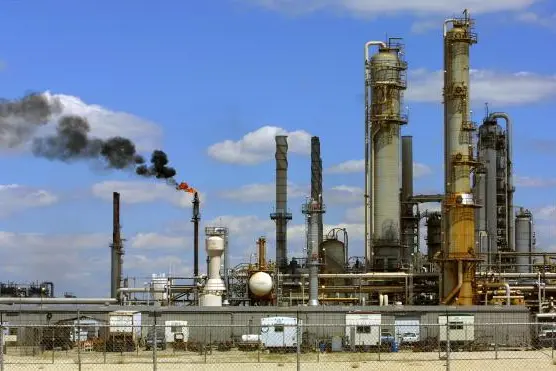PHOTO
- Oil prices drop more than 1 percent
- Asian shares retreat on U.S.-China trade tensions
- Saudi Arabia’s index adds 1.6 percent
- Dollar remains unchanged, gold rises
Oil prices
Oil prices retreated early on Wednesday as a weaker oil demand outlook weighed on prices.
The U.S. Energy Information Administration (EIA) cut its forecasts for 2019 world oil demand growth and U.S. crude oil production in a monthly report released on Tuesday.
The EIA lowered its 2019 world oil demand growth forecast by 160,000 barrels per day (bpd) to 1.22 million bpd and wound back its forecast for 2019 U.S. crude production to 12.32 million bpd, 140,000 bpd less than the May forecast.
U.S. crude inventories rose by 4.9 million barrels in the week ended June 7 to 482.8 million barrels, according to data from the American Petroleum Institute (API) on Tuesday. That compared with analysts’ expectations for a decrease of 481,000 barrels, which also weighed on oil prices.
Brent crude futures, the international benchmark for oil prices, were down 87 cents, or 1.4%, at $61.42 a barrel by 0231 GMT.
U.S. West Texas Intermediate (WTI) crude futures were down 85 cents, or 1.6%, at $52.41 per barrel.
“Oil prices have struggled to retain bullish gains as traders stay cautious over heightened geopolitical risks and persistent weakness in the global economic backdrop,” Benjamin Lu, commodities analyst at Phillips Future in Singapore, told Reuters.
Global markets
Asian shares dropped early on Wednesday on trade tensions between the United States and China.
United States President Donald Trump said on Tuesday he was holding up a trade deal with China and had no interest in moving ahead unless Beijing agrees to four or five “major points” which he did not specify.
MSCI’s broadest index of Asia-Pacific shares outside Japan dropped 0.38% after two days of gains.
Overnight on Wall Street, the Dow eased a tiny 0.05%, while the S&P 500 lost 0.03% and the Nasdaq 0.01%.
Middle East markets
The Saudi index was up 1.6% on Tuesday with all its banks gaining. Al Rajhi Bank added 1.5% and National Commercial Bank climbed 3.3%.
In Dubai, the index traded flat with budget airline Air Arabia gaining 2.9% and Dubai Islamic Bank losing 1%.
The Abu Dhabi index declined 0.6%, with First Abu Dhabi Bank, the United Arab Emirates' largest lender, dropping 0.8% and Emirates Telecommunications down 1.1%.
Qatar's index rose 0.8% with financials leading the gains. The market heavyweight, lender Qatar National Bank, rose 2.1% and Doha Bank jumped 5%.
Egypt's blue-chip index closed 0.4% higher, as a 2.2% gain in its heavyweight lender Commercial International Bank offset other declining stocks.
Kuwait’s premier market index gained 0.9 percent, Bahrain’s index edged 0.1 percent lower and Oman’s index edged 0.2 percent higher.
Currencies
The dollar was mainly unchanged early on Wednesday.
The dollar index, which measures the greenback against a basket of six major currencies was effectively flat at 96.707, just above the 96.459 level it hit on Monday, its lowest since late March.
Precious metals
Gold prices rose on Wednesday on a weaker dollar.
Spot gold rose 0.5% to $1,333.06 by 0328 GMT. U.S. gold futures were up 0.4% at $1,336.60 an ounce.
(Reporting by Gerard Aoun; Editing by Mily Chakrabarty)
Our Standards: The Thomson Reuters Trust Principles
Disclaimer: This article is provided for informational purposes only. The content does not provide tax, legal or investment advice or opinion regarding the suitability, value or profitability of any particular security, portfolio or investment strategy. Read our full disclaimer policy here.
© ZAWYA 2019




















